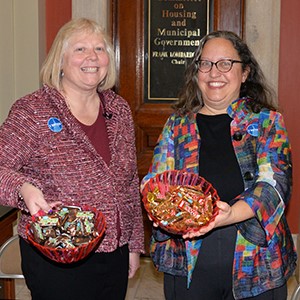 |
|
2/15/2023
|
Sweet victory: Peanut butter cups win ranked-choice chocolate election
|
 STATE HOUSE – Even in a crowded field, peanut butter cups won a decisive victory this Valentine’s Day. STATE HOUSE – Even in a crowded field, peanut butter cups won a decisive victory this Valentine’s Day.
The sweet treat was the clear winner in a “chocolate election” staged yesterday by Rep. Rebecca Kislak (D-Dist. 4, Providence) and Sen. Valarie Lawson (D-Dist. 14, East Providence) as a demonstration of ranked-choice voting.
Ranked-choice voting, also called instant run-off voting, allows voters to rank the candidates in order of preference in races when there are more than two candidates. The votes are tabulated in rounds, with the lowest-ranked candidates eliminated in each round until there are only two candidates left. The one who is determined to have received the majority of the votes in the final round is declared the winner.
Yesterday’s election — held online and open to anyone — pitted Reese’s Peanut Butter Cups against Hershey’s Kiss, Twix, Kit Kat and Milky Way, and asked voters to rank the five chocolates in their order of preference. Samples of all the candidates (candydates?) were available at tables outside the House and Senate chambers around yesterday’s legislative sessions.
As it turned out, it was just one vote that prevented the election from going to a second round. Of the 505 people who voted, 253 — exactly one vote more than 50% — ranked Reese’s Peanut Butter Cups as their top choice. Twix came in a distant second at 86 first-choice votes, followed by Kit Kat (75), Hershey’s Kiss (49) and Milky Way (42). Full election results are available at this link.
Had peanut butter cups received one less vote, the election would have gone to a second round, in which Milky Way would have been eliminated, and its 42 votes would be redistributed to the candidates chosen as no. 2 by each of those 42 voters.
While the majority vote for peanut butter cups prevented the demonstration from showing how subsequent rounds of ranked-choice voting would work, the exercise was a sweet victory in bringing attention to the concept of ranked-choice voting.
“With five delicious choices, this election was a good way to show people how ranked-choice voting allows you to vote for your favorite without having to worry about how other people might vote, because if your first choice is not popular, you know that your second choice will count if it would make a difference. This was a fun way to give Rhode Islanders a taste of a voting method that is gaining support throughout the country, and one that we could use in Rhode Island to give voters more of a voice than a simple pick-one ballot,” said Representative Kislak.
Said Senator Lawson, “Ranked-choice voting is an idea whose time has come. It’s being used successfully in other states, and even if the concept is a little more difficult to explain than simple majority voting, voters in those jurisdictions have been happy the process and the results. We believe that ranked-choice would improve Rhode Islanders’ satisfaction and engagement in our elections, which is a win for democracy.”
Senator Lawson and Representative Kislak this week are introducing legislation (2023-H 5649, 2023-S 0322) that would institute ranked-choice voting for presidential preference primaries, beginning with the 2024 presidential election. In 2020, the Democratic presidential primaries in Alaska, Nevada, Hawaii, Kansas and Wyoming all employed ranked-choice voting.
Proponents of ranked-choice voting point to its elimination of “spoiler” candidates or vote-splitting —
situations where two or more candidates who appeal to a group of like-minded voters split that group’s votes, enabling the victory of a different candidate even if that candidate doesn’t win a majority.
The advantage to voters, according to FairVote, a national organization dedicated to advancing ranked-choice voting, is that “voters can sincerely rank candidates in order of preference. Voters know that if their first choice doesn’t win, their vote automatically counts for their next choice instead. This frees voters from worrying about how others will vote and which candidates are more or less likely to win.” There also exists research suggesting ranked-choice voting results in more civil campaigns and less negative campaigning.
For more information, contact:
Meredyth R. Whitty, Publicist
State House Room 20
Providence, RI 02903
(401) 222-1923
|
|